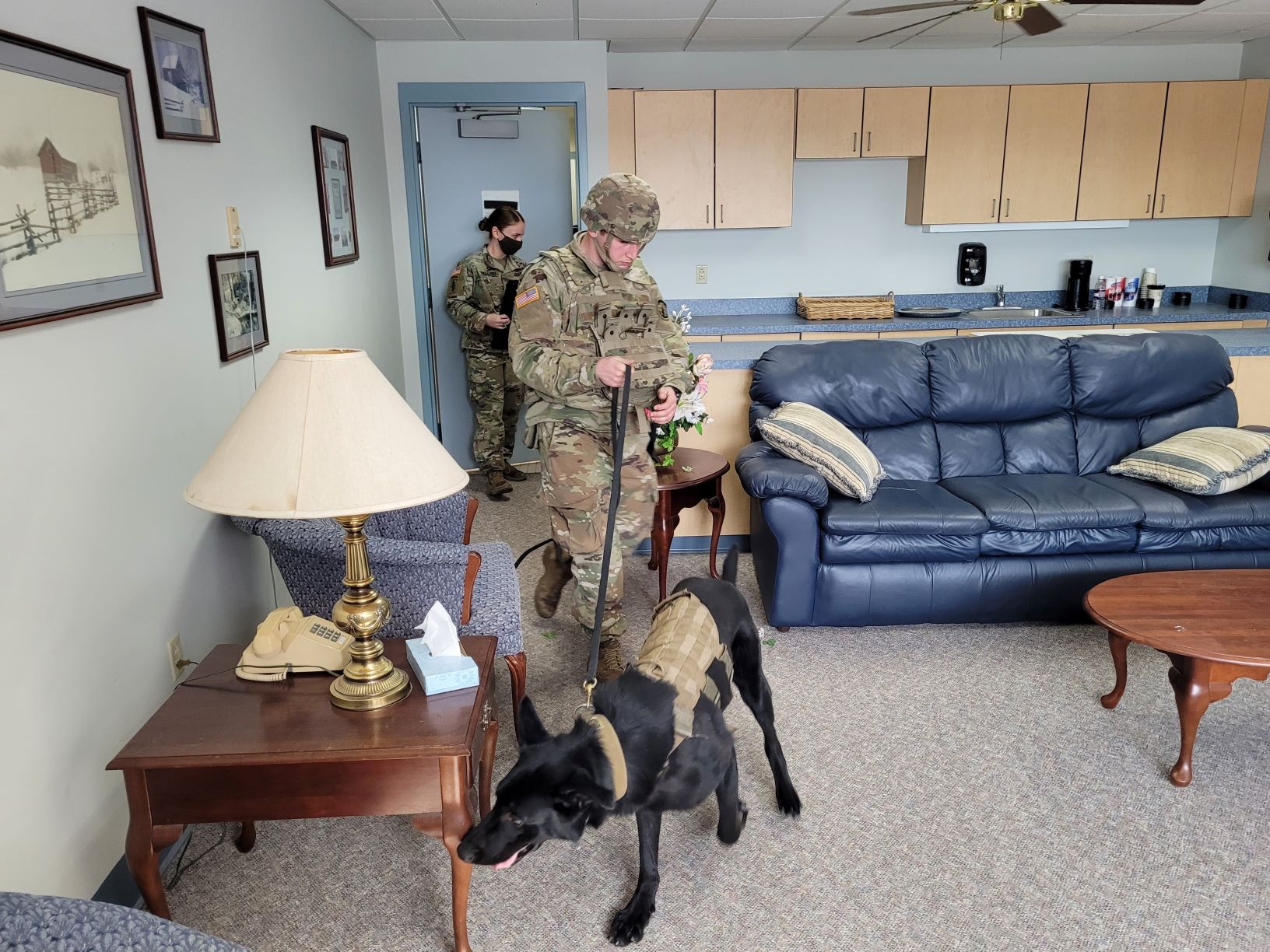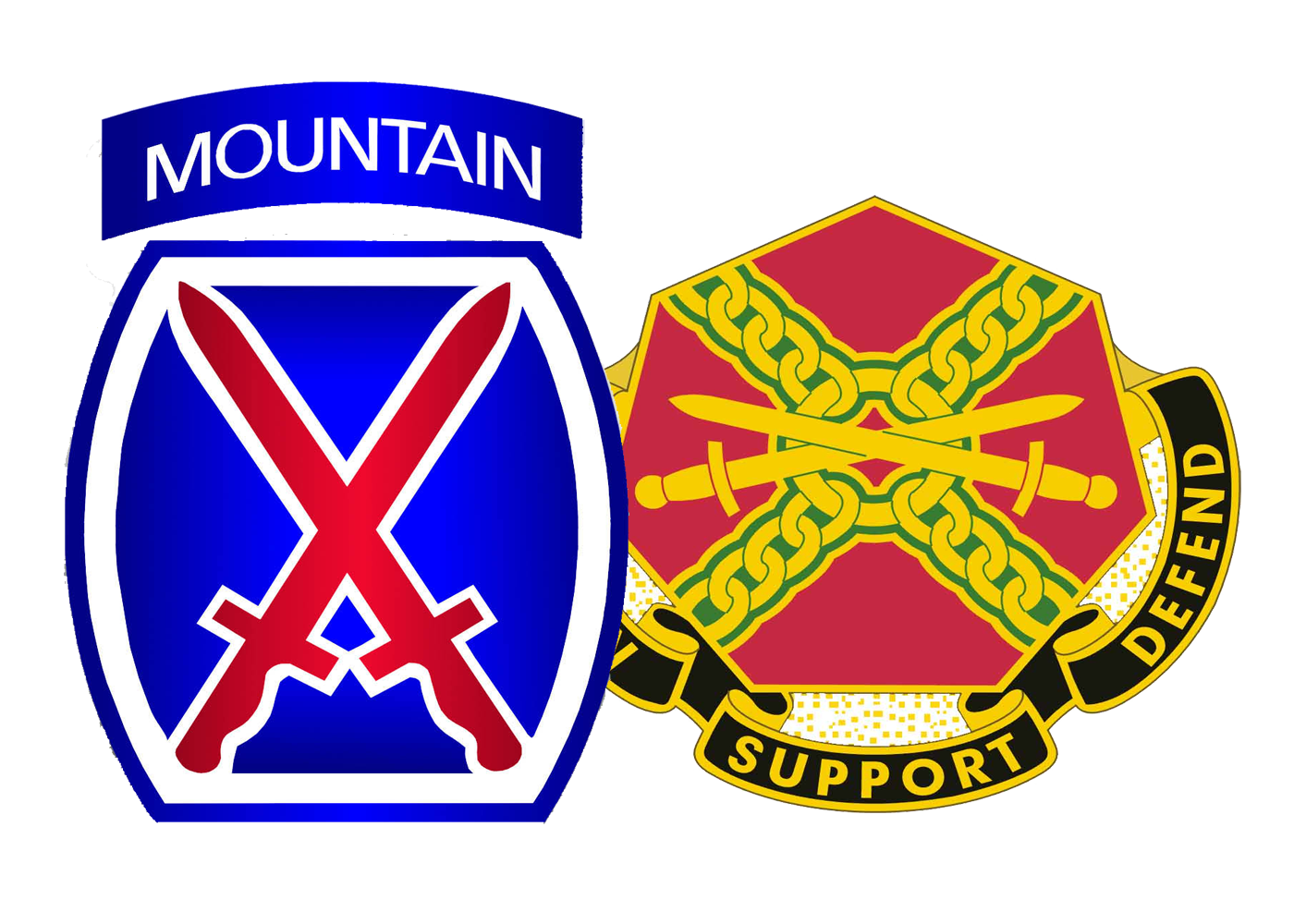
Pfc. Talon Bush and Military Working Dog Redy, with the 8th Military Police Detachment, search a room inside the Darby Rapid Deployment Facility at Fort Drum on Feb. 16, as part of a validation process to test their skills before they can become a certified MWD team. (Photo by Mike Strasser, Fort Drum Garrison Public Affairs)
Fort Drum Military Working Dog teams put readiness to the test
Mike Strasser
Fort Drum Garrison Public Affairs
FORT DRUM, N.Y. (Feb. 17, 2022) – Pfc. Talon Bush and Military Working Dog Redy methodically searched more than a dozen rooms and hallways for explosive materials Feb. 16 inside Fort Drum’s Darby Rapid Deployment Facility.
It’s the same building other MWD teams from the 8th Military Police Detachment swept last month before a scheduled visit from the governor. But for Bush, it was part of a weeklong validation process.
Sgt. 1st Class Coleeta Smith, 8th Military Police Detachment kennel master, said that every MWD team is validated at Fort Drum before they can proceed to certification, which essentially allows them to do their jobs in accordance with the regulation.
During validation, the MWD team runs an obedience course, demonstrates controlled aggression, conducts a scout and building search, reacts to gunfire and tests on odor recognition. They also have to complete five detection lanes.
“Given a building, a roadway, vehicle or open area, we plant an odor – whether it be explosive or drugs, depending on the dog – and the MWD team is given their boundaries to detect the odor through a systematic search,” Smith said.
There are eight different explosive odors they can plant for testing purposes, placed at different heights and depths and not usually visible to either MWD or handler.
“The handler can see what we call a change of behavior in the Military Working Dog,” Smith said. “The handler can see how the dog’s body posture changes and bracketing behavior toward the odor before they give the passive final response.”
Smith said they change up the venues where detection is tested – one day at the RDF, the next at Central Issuing Facility. This allows handlers to learn how to break down different areas, whether it be a barracks, auditorium or warehouse, for a systematic search.
“When you are first starting out you don’t know how to systematically break down an area for the dog to search effectively,” she said. “But as you gain experience to different areas, you learn how to break them down into pieces so you are not walking into explosives that the dog did not clear.”
It also exposes MWDs to unfamiliar environments they may not have been seen during training, such as the Outdoor Recreation facility.
“There were people on the archery course right next to us,” Smith said. “Most MWDs won’t be fazed by it, and they can work around these different factors. But if you have a team just starting out, the dog might be a little more jumpy or concerned by what’s going on.”
Smith said that it is natural for a MWD team to be nervous during validation, even if they excelled during training.
“They don’t associate training with being an evaluation so they are more relaxed,” she said. “But now we add that bit of pressure of it being a test and you especially see it in the younger population. Everyone gets nervous in certification, but it is how you handle that stress that makes the difference. So we want to make sure they can handle it appropriately so when they go on missions or deployments they are capable of overcoming that.”
How a handler deals with stress also affects the performance of the MWD.
“We have a saying that ‘Everything runs down leash,’ and when a handler is stressed, some dogs will stop searching,” Smith said. “After a handler builds rapport with the dog, these dogs feel every emotion that the handler feels. They know when the handler is upset or under pressure, because you can see the dog get amped up and protective. And they know when their handler is calm, cool and collected.”
Smith said that Bush and MWD Redy performed well during the validation and responded well to feedback. Bush is one of the newest members of the 8th MP Detachment. He was assigned as MWD Redy’s handler in late November, and they have been training for certification ever since.
It also gives Bush time to bond with Redy.
“We usually do that with a lot of grooming, taking walks or just playing,” he said. “The more time you spend with them, the more you build rapport.”
Bush described Redy, a Patrol, Explosive Detector Dog (PEDD), as an energetic puppy with an independent streak.
“When Redy starts doing his own thing, I kind of get a little frustrated,” he said. “But I have to be careful, because if I feel frustrated, then Redy will start to feel that and act out. It’s always best to have a clear mind when we’re doing a search.”
Knowing the dog’s personality and tendencies helps Bush strategize how to work more effectively. For example, because Redy sometimes likes to rush into a room, Bush will slowly crack a door open so an explosive odor can be detected before they enter.
Although Bush originally wanted to enlist as Army firefighter, he said becoming a MWD handler has been rewarding.
“I’ve met a whole lot of people, made a bunch of friends and, overall, it’s a pretty good job,” he said. “Playing with dogs all day is a dream job for a lot of people.”





